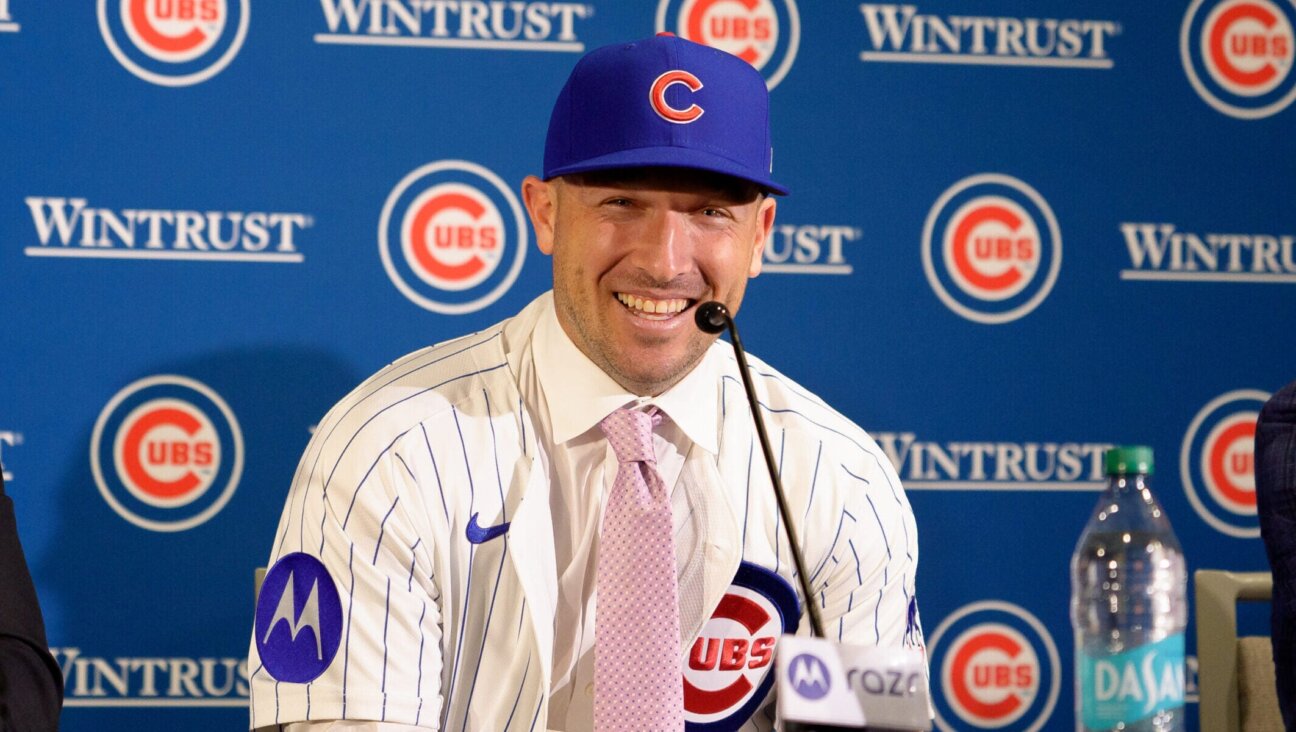Synagogue Group Backs John Roberts Nomination
WASHINGTON — As liberal organizations struggle to line up Jewish support for an advertising campaign to block the Supreme Court nomination of John Roberts, the country’s second-largest synagogue movement has declared him “qualified” for the job.
Leaders of the United Synagogue of Conservative Judaism sent a letter Monday to Senator Arlen Specter, the Pennsylvania Republican and chairman of the Senate Judiciary Committee, stating that Roberts “is qualified to serve.” The United Synagogue, with more than 700 congregations and claiming to represent 1.5 million followers, offered its backing, though the movement’s rabbis and members tend to lean left on domestic issues.
The United Synagogue’s letter comes as only one Jewish organization, the National Council of Jewish Women, has joined liberal interest groups like People for the American Way and the Alliance for Justice in the campaign to block Roberts, President Bush’s selection to replace retiring Justice Sandra Day O’Connor. The anti-Roberts coalition has failed to attract the assistance of other Jewish organizations that support a liberal domestic agenda, including groups associated with Reform Judaism, the country’s largest synagogue movement.
The decision by most organizations to sit out the anti-Roberts campaign was not a surprise to most informed observers, since Jewish groups historically have avoided weighing in directly on judicial nominations, opting instead to send letters to lawmakers recommending specific questions dealing with issues of concern.
The main exception has been the women’s council, which launched its so-called BenchMark campaign in 2002 with the goal of blocking Bush’s most conservative nominees. The Religious Action Center of Reform Judaism, the movement’s Washington office, also has displayed a newfound willingness since 2003 to oppose Bush’s most controversial judicial picks.
Leaders from both groups praised the United Synagogue when the organization first released its criteria for judges in June, before O’Connor announced her retirement and Bush tapped Roberts to replace her. At the time, some abortion-rights activists interpreted the standards as a warning to Bush against selecting a conservative ideologue, though United Synagogue leaders insisted that they simply were trying to establish a non-ideological guide for evaluating future nominees.
Some important figures within the Conservative movement took issue with the decision-making process that produced the letter to Specter. Before sending the letter, the United Synagogue’s public policy committee did not consult with the organization’s board or with other Conservative institutions. Instead, committee members took the decision to endorse Roberts after they deliberated and reached a consensus.
Rabbi Joel Meyers, executive vice president of the Conservative movement’s Rabbinical Assembly, told the Forward that although the United Synagogue has the right to voice its own position on current affairs, he would have expected the organization to coordinate its position on an issue as important as a Supreme Court nominee.
“We do consult on major issues — that did not happen in the case of Judge Roberts,” Meyers said. “It would have been beneficial for all of us to have had that occur.”
Irwin Kula, a Conservative rabbi and president of CLAL — The National Jewish Center for Learning and Leadership, also said that a decision on such a weighty issue merited a broader consultation process within the movement.
Rabbi Jerome Epstein, executive vice president of the United Synagogue, said that it would have been impractical to bring the issue before the organization’s board. “We felt that if you want to do a serious deliberation, then you need an active working group to do that,” Epstein said, adding that members of the public policy committee reviewed a great deal of material on Roberts before making their decision.
In June, the United Synagogue was criticized by some Conservative rabbis after it was reported in the Forward that the two co-chairmen of its public policy committee had sent letters to Bush and Senate Majority Leader Bill Frist in support of John Bolton, the president’s embattled nominee for U.S. ambassador to the United Nations. Officials at the United Synagogue later clarified that the co-chairmen had sent the letters as individuals and not on behalf of the organization.
At the time, some sources in the movement said that United Synagogue officials had been trying to figure out a way to establish good relations with the White House without upsetting the organization’s mostly liberal constituency.
But in the case of endorsing Roberts as “qualified,” Epstein said that the United Synagoue was not politically motivated. To the contrary, the organization’s executive director added, “We are trying to de-politicize the issue.”
The letter to Specter defined “qualified” as someone who is well trained, eschews “an ideologically defined approach to judicial interpretation” and demonstrates “a balanced respect for foundational documents, reasonable interpretation and societal realities.”
In a statement, the United Synagogue’s director of public policy, Mark Waldman, appeared to anticipate criticism from followers.
“While many in our movement might believe they will disagree with Judge Roberts on one or more critical political issues, such litmus tests must not be the basis on which we assess the qualification of our judges,” Waldman said. “We must instead examine a nominee’s record, and Judge Roberts certainly has the essential characteristic for judges as derived from Jewish tradition.”
Waldman signed the letter to Specter, along with the co-chairmen of the United Synagogue’s public policy committee, William Bresnick of Maryland and Rabbi Jack Moline, the religious leader of Agudas Achim Congregation in Alexandria, Va.
While few Jewish organizations are weighing in directly, some groups are sending letters to the Senate Judiciary Committee, recommending specific questions for lawmakers to ask the nominee at his confirmation hearings, slated to start September 6.
Officials at Jewish organizations said their main reason for not taking sides is that Roberts has a thin record on the legal issue that groups generally care about most: the separation of church and state. “There isn’t much there, and it’s generally harder [to challenge a judicial nominee] when there is no paper trail,” said Marc Stern, legal counsel of the American Jewish Congress.
The women’s council — which is opposing Roberts, as it did in January 2003 when Bush tapped him for a seat on the United States Court of Appeals for the District of Columbia Circuit in January of 2003 — has objected to Roberts primarily because of his positions on reproductive rights. While other Jewish groups also care about abortion, as well as about other civil and individual rights, they have in recent years litigated on church-state relations more than on any other issue.
As a judge, Roberts has not handled a single church-state case, leaving few indications of his personal legal opinion on the issue. But advocates of strict church-state separation are concerned by several briefs he authored as a principal deputy solicitor general in the Reagan and first Bush administrations from 1989 and 1993, respectively. During that time, Roberts represented the White House in several cases involving government and religion.
In 1989, Roberts authored a brief arguing that school officials and clergy should be allowed to deliver prayers at public school graduation ceremonies, a position that the Supreme Court rejected by a 5-4 majority.
That brief alone, said Jeremy Leaming of Americans United for Separation of Church and State, should drive anyone who cares about church-state separation to oppose Roberts.
Officials at Jewish organizations countered that when Roberts wrote the brief, he was representing the views of the White House that appointed him. The same goes for several other, less controversial positions that he articulated while serving in the solicitor general’s office, according to legal experts with Jewish groups.
Roberts has taken issue with the so-called “Lemon Test,” which the Supreme Court has applied since 1971 (Lemon v. Kurtzman) to cases brought under the constitutional clause barring Congress from “respecting an establishment of religion.” The Lemon Test, which has been upheld several times by a 5-4 majority, requires government officials to refrain from acting with a religious agenda, taking actions that endorse a particular religion or that endorse religion in general.
Despite concerns about Roberts, Stern argued that the briefs in question do not suggest he would necessarily be as conservative as the court’s two most conservative members, Justice Antonin Scalia and Justice Clarence Thomas.
“None of these positions are alien to the Court, and they certainly do not make Roberts a Scalia or a Thomas,” Stern said.
















